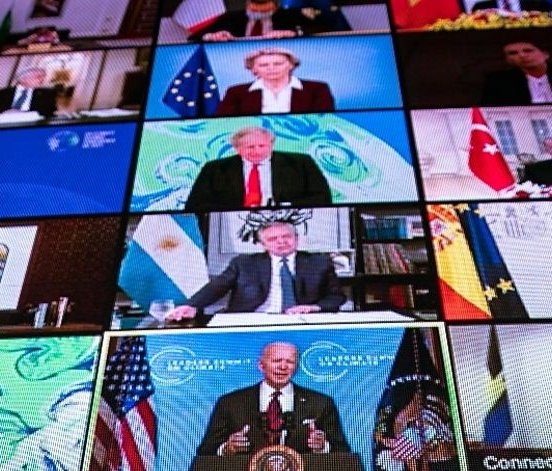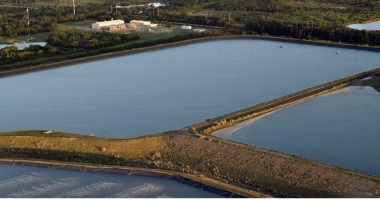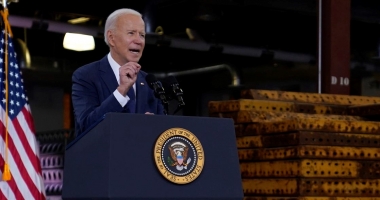Climate, Health and Equity Brief
Earth Day, global leaders and climate commitments
April 23, 2021

The Climate, Health & Equity Brief is GMMB’s take on the week’s news on the current impacts of climate change. If you haven’t subscribed yet, you can do so by clicking here.
Hot Topic: Ambition. In honor of Earth Day, the White House is currently hosting 40 world leaders in an unprecedented, two-day virtual climate summit. Convening just three months after President Biden symbolically re-entered the U.S. into the Paris Agreement on his first day in office, the event is meant to help the U.S. regain its leadership role at the forefront of global climate action and encourage greater climate ambitions from the world’s largest economies. Among its day-one highlights:
- President Biden introduced a new target to cut U.S. carbon emissions by 50-52 percent by the end of the decade compared to 2005 levels—a far more aggressive goal than former President Obama’s 2015 pledge of up to 28 percent and Trump’s withdrawal from that commitment.
- President Biden also announced a substantial increase in the amount of climate aid the U.S. will offer to developing countries, pledging to reach around $5.7 billion a year by 2024—double the amount offered by the U.S. annually between 2013 and 2016.
- Japanese Prime Minister Yoshihide Suga pledged to reduce emissions by 46 percent compared to 2013 levels, emphasizing a transition away from fossil fuel-powered electricity and greatly strengthening the country’s previous target of a 26 percent reduction.
- Canadian Prime Minister Justin Trudeau committed to reducing the nation’s emissions 40-45 percent by 2030, expanding its past goal of 30 percent in the next decade.
- Brazil’s President Jair Bolsonaro announced a new target to make Brazil carbon neutral by 2050, pledging to end illegal deforestation by 2030 as a way to meet that goal—though many are skeptical of these vows, as deforestation has surged under Bolsonaro’s presidency.
- British Prime Minister Boris Johnson unveiled perhaps the boldest emissions reduction target, announcing a goal to slash carbon emissions in the U.K. by 78 percent by 2035, compared to 1990 levels. Johnson aims work with Parliament to enshrine this new target into law by summer.
Beyond national commitments, the event has been notable in its scale and its speakers. Discussions explored the intersections of climate change and national security, innovation, finance and more, bringing together representatives from nations, corporations, universities and indigenous groups. With an expansive view of the crisis and experts speaking to solutions, the summit has underscored the necessity of working across borders, oceans and cultures to solve the greatest challenge of our lifetimes.
And yet, the most substantial challenges still lie ahead. China—by far the world’s leading emitter, with double the carbon emissions of the U.S.— failed to offer enhanced carbon reduction commitments. The same is true for India, the world’s third-largest CO2 emitter behind China and the United States.
Even among the world leaders doubling down on the need to tackle this global crisis, it remains to be seen how these ambitious commitments will play out. In order to meet its new climate goals, the U.S. must radically transform its reliance on fossil fuels, requiring new policies and increased federal spending on the infrastructure required to make clean energy the norm across the nation. As President Biden emphasized, responding to the climate crisis is a challenge, but also an opportunity to invest in the technologies of the future, and to create a world that is healthier and more equitable for the 8 billion people who call Planet Earth home.
— Matt & Traci, GMMB
Action
On day one of his international climate summit, President Biden announced a new goal of cutting economy-wide U.S. greenhouse gas emissions by 50 to 52 percent below 2005 levels by 2030. (Axios)
Foreign leaders—including heads of state from six countries—announced enhanced climate pledges in a show of solidarity with President Biden’s new goal. (The New York Times, NPR)
A landmark climate change law approved by the EU commits its 27 member nations to at least a 55 percent reduction in net emissions by the end of the decade as part of a broader target to achieve net-zero emissions by 2050. (Reuters)
This week, Interior Secretary Deb Haaland established a new Climate Task Force to develop climate mitigation strategies and accelerate renewable energy development and revoked Trump-era rules that prioritized fossil fuel extraction over public land conservation. (CleanTechnica)
The newly-launched Blue Nature Alliance, led by Conservation International and several environmental philanthropies, aims to protect seven million square miles of ocean from threats like climate change, pollution and overfishing over the next five years. (CNN)
As the U.S. Securities and Exchange Commission pledges to toughen its oversight of ESG investment funds, a recently formed financial sector alliancehas pledged to ensure that emissions from current lending and investment portfolios achieve net-zero by 2050, with a focus on divestment from fossil fuels and other industrial sectors. (Bloomberg, Axios)
“This is a moral imperative and an economic imperative. A moment of peril but also a moment of extraordinary possibilities.”
– President Joe Biden
Politics & Economy
Despite the U.S. and China’s formal agreement last week to cooperate on climate mitigation efforts, Chinese President Xi did not announce any strengthened commitments during this week’s Leaders Climate Summit, opting instead to reiterate his target to achieve net-zero emissions by 2060. (AP News, The New York Times)
A new proposal from the United Mine Workers of America—endorsed by Senator Joe Manchin (D-WV)—indicates that the union would support a clean energy transition in exchange for renewable energy jobs, compensation for displaced coal miners and funding to clean up abandoned fossil fuel mines. (AP News)
A new report from the journal Nature found that the cost of wind power could be cut in half by 2050 due to ongoing technological innovations that make wind turbines larger and more efficient. (The Independent)
Treasury Secretary Janet Yellen has named John Morton, a former private equity investor, as head of the department’s Climate Hub, sparking criticism from Democrats and environmentalists pushing for greater regulation of fossil fuel financing. (Politico)
Equity
The American Lung Association’s 2021 State of the Air report revealed that over 135 million Americans live in communities with unhealthy levels of ozone or particulate matter pollution and that people of color are 61 percent more likely than white people to live in counties with poor air quality. (USA Today)
A recent investigation revealed that for nearly 20 years, the EPA has turned a blind eye to underreported emissions from petroleum refineries, whose operations expose hundreds of working-class communities across the U.S. to toxic and often cancer-causing chemicals like benzene. (InsideClimate News, Longread)
One day after California’s Marin County imposed mandatory water restrictions due to local reservoir levels dropping to the lowest point in three decades, Governor Gavin Newsom declared a drought emergency in Mendocino and Sonoma counties. (San Francisco Chronicle)
Kicker
Want to follow along with the rest of President Biden’s Leaders Summit on Climate? Tune into day two of the summit here.






